Spookfish


Spookfish
Winteria telescopa
The Spookfish’s eyes act as a telescope and are designed to maximize light in the deep ocean. Its eyes contain rod cells that help distinguish between ambient light and bioluminescent light. This adaptation helps avoid predators and catch prey.
Picture Credit: https://www.natureplprints.com/deep-sea/deep-sea-fish-winteria-telescopa-15230734.html
More Posts from Bioluminescentoceangoddess and Others
If you are interested in learning about different types of plankton in the ocean, please check out @planktonqueen page. I post a lot of cool species, photos, and facts.

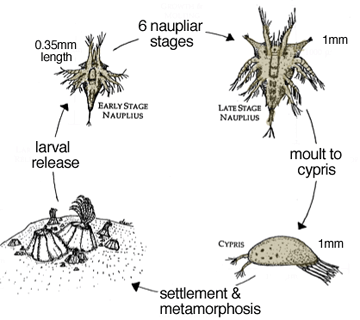
Barnacle Larvae
Amphibalanus eburneus
When we think of barnacles, we think of the hard, white crustaceans that grow on the side of boats and docks. However, barnacles go through a variety life stages and metamorphosis before they spend their life on a hard surface. The image above is a barnacle larvae when it is in the cypris stage, think of it as a baby barnacle. This larvae is an example of zooplankton and spends a short period of time floating around in the water column. The second image summarizes the life cycle of a barnacle.
Photo source: https://www.nyharbornature.com/blog/barnacles-are-reproducing
https://www.pinterest.com/pin/453174781229895797/

Pram Bug
Phronima sedentaria
The Pram Bug is a deep sea amphipod that is located between 200 to 1000m in the ocean. It has a translucent exoskeleton and can see primarily blue light. It is also is contained in a hollowed out barrel that is used for protection and to house babies. The image above is a female pram bug carrying its young.
Photo Credit:https://ocean.si.edu/ocean-life/invertebrates/phronima-female-and-young

Hula Skirt Siphonophore
Physophora hydrostatica
The Hula Skirt Siphonophore a deep sea siphonophore that is found between 700 m to 1000m. It is made of a colony of hundreds tiny zooids. The top portion of the colony holds the swimming bells, which allow the colony to move. The bottom of the siphonophore holds the orange ‘hula skirt,’ which is full of stinging tentacles.
Photo link : https://twitter.com/montereyaq/status/1162068535331311617?lang=da
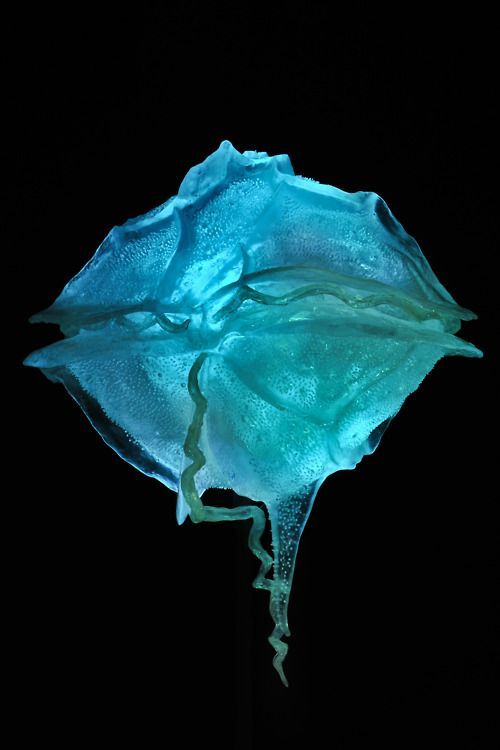

Pyrodinium bahamense
Pyrodinium bahamense is a tropical species of dinoflagellates that is found primarily in Atlantic Ocean waters. It prefers salinity around 20 psu and blooms when there are large amounts of nitrogen in the water. The dinoflagellate glows bright blue when agitated by motion. Furthermore, even though this plankton species is beautiful to look at, it causes seafood toxicity.
Photo credit: https://alchetron.com/Pyrodinium-bahamense
https://wonderchews.com/bodies-of-light/

Scaly Dragonfish
Stomias Boa
The Scaly Dragonfish is about 32cm long and found at depths between 200 to 1500m. The long purple barbel on its chin is used to lure in prey. When the pery gets close enough, it swings its jaws forward swallowing the prey whole.
Photo credit: https://alchetron.com/Stomias
Video on the fish: https://www.youtube.com/watch?time_continue=69&v=9oB_61aI2iQ&feature=emb_title

Threadfin Snailfish
Careproctus longifilis
The Threadfin Snailfish resembles a prehistoric tadpole that is ghostly white. The holes in its face are large sensory pores that help them detect changes in the ocean. It is often found at depths between 1900 to 2997 meters.
Photo credit: https://www.timeout.com/singapore/museums/creatures-of-the-deep
Dear ocean enthusiast and supporters,
Hi everyone, thank you for supporting my blog. I have gained over 500 followers and that is worth celebrating. I will try my best to post every day some of the amazing creatures that live in the deep ocean. Have a great night!
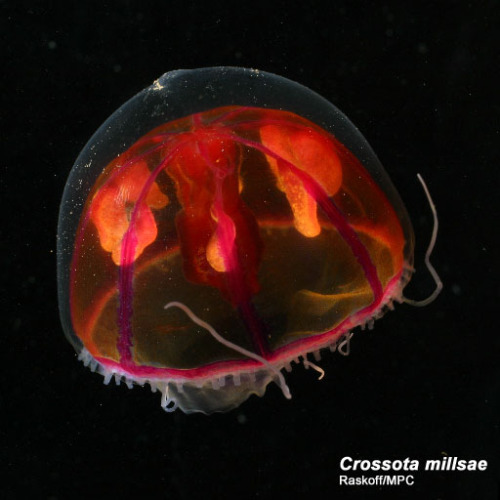
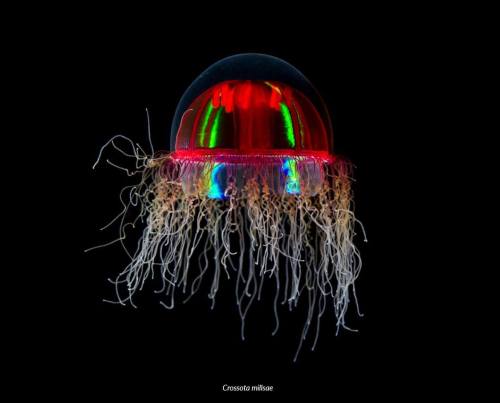
Psychedelic Medusa
Crossota millsae
The Psychedelic Medusa is a deep-sea hydrozoan that is abundant in the North Pacific. The mini-jelly is found at depths between 1000m to 3800m, and are often observed drifting near the ocean floor. It also has an eccentric reproduction behavior uncommon in cnidarians. The females display viviparity, and carry the babies in her bell until they are ready to hatch.
Photo credit: http://www.arcodiv.org/watercolumn/cnidarian/Crossota_millsae.html
https://twitter.com/spothvegr/status/1030177493075079169


Gulper Eel
Saccopharynx sp.
The Gulper Eel is known for its massive jaws, which are capable of swallowing prey whole. It’s stomach is also able to expand twice its size. It is found only in the deep see about 2000 to 3000 meters in depth.
Photo credit: https://www.youtube.com/watch?v=XRO0IjSoHGA
https://marinebiochemistrygc2018.weebly.com/deep-sea-adaptations

Squarenose Helmetfish
Scopelogadus beanii
The Squarenose Helmetfish is found between 800m to 4000m in the ocean. It received this unique name due to its scales reminding scientists of an armored helmet worn by medieval knights. It also has unusual holes around its face, and the white strands covering its face are sensory canals.
Photo credit: https://www.vistaalmar.es/especies-marinas/peces-extranos/449-que-peces-mas-extranos.html
-
 catsrcoolyeet reblogged this · 3 years ago
catsrcoolyeet reblogged this · 3 years ago -
 catsrcoolyeet liked this · 3 years ago
catsrcoolyeet liked this · 3 years ago -
 broodriber reblogged this · 3 years ago
broodriber reblogged this · 3 years ago -
 nejniy-pulse liked this · 3 years ago
nejniy-pulse liked this · 3 years ago -
 nightmaregorepng liked this · 3 years ago
nightmaregorepng liked this · 3 years ago -
 astrotracksuitbattalion liked this · 3 years ago
astrotracksuitbattalion liked this · 3 years ago -
 despair-with-walnuts liked this · 3 years ago
despair-with-walnuts liked this · 3 years ago -
 liina-puff liked this · 3 years ago
liina-puff liked this · 3 years ago -
 in-soft-grass reblogged this · 3 years ago
in-soft-grass reblogged this · 3 years ago -
 in-soft-grass liked this · 3 years ago
in-soft-grass liked this · 3 years ago -
 sagegreensage liked this · 3 years ago
sagegreensage liked this · 3 years ago -
 digitalsandmandala liked this · 3 years ago
digitalsandmandala liked this · 3 years ago -
 3r4d liked this · 3 years ago
3r4d liked this · 3 years ago -
 miresgaleth liked this · 3 years ago
miresgaleth liked this · 3 years ago -
 nigmos liked this · 3 years ago
nigmos liked this · 3 years ago -
 neonhearted reblogged this · 3 years ago
neonhearted reblogged this · 3 years ago -
 mysticalstreamsalutations liked this · 3 years ago
mysticalstreamsalutations liked this · 3 years ago -
 agent-plaguemask reblogged this · 3 years ago
agent-plaguemask reblogged this · 3 years ago -
 creaturedeityendless liked this · 3 years ago
creaturedeityendless liked this · 3 years ago -
 dutchessdemented reblogged this · 3 years ago
dutchessdemented reblogged this · 3 years ago -
 dutchessdemented liked this · 3 years ago
dutchessdemented liked this · 3 years ago -
 vaguelyexistingcloud liked this · 3 years ago
vaguelyexistingcloud liked this · 3 years ago -
 soulless-blunder reblogged this · 3 years ago
soulless-blunder reblogged this · 3 years ago -
 sabinekarl liked this · 3 years ago
sabinekarl liked this · 3 years ago -
 soulless-blunder liked this · 3 years ago
soulless-blunder liked this · 3 years ago -
 sweet-sea-monster reblogged this · 3 years ago
sweet-sea-monster reblogged this · 3 years ago -
 yesunieyee reblogged this · 3 years ago
yesunieyee reblogged this · 3 years ago -
 yesunieyee liked this · 3 years ago
yesunieyee liked this · 3 years ago -
 cursedd-plazzer liked this · 3 years ago
cursedd-plazzer liked this · 3 years ago -
 dimens1ons liked this · 3 years ago
dimens1ons liked this · 3 years ago -
 sadviper liked this · 3 years ago
sadviper liked this · 3 years ago -
 arlothia reblogged this · 3 years ago
arlothia reblogged this · 3 years ago -
 terribleteej reblogged this · 3 years ago
terribleteej reblogged this · 3 years ago -
 terribleteej liked this · 3 years ago
terribleteej liked this · 3 years ago -
 brines liked this · 3 years ago
brines liked this · 3 years ago -
 diminishedtobe liked this · 4 years ago
diminishedtobe liked this · 4 years ago -
 opossum-mossum liked this · 4 years ago
opossum-mossum liked this · 4 years ago -
 that-lesbian-phenotype liked this · 4 years ago
that-lesbian-phenotype liked this · 4 years ago -
 okhire liked this · 4 years ago
okhire liked this · 4 years ago -
 myartrefblog reblogged this · 4 years ago
myartrefblog reblogged this · 4 years ago -
 rabbitsartcorner liked this · 4 years ago
rabbitsartcorner liked this · 4 years ago -
 disableddeinosaur liked this · 4 years ago
disableddeinosaur liked this · 4 years ago -
 fishrfriendsurfood liked this · 4 years ago
fishrfriendsurfood liked this · 4 years ago -
 ailinenelpaisdelasmaravillas liked this · 4 years ago
ailinenelpaisdelasmaravillas liked this · 4 years ago
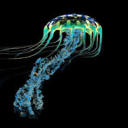
Bioluminescence is a chemical reaction that produces light. Many deep sea animals use bioluminescence. This blog is dedicated to educating the public about the amazing creatures that thrive in the deep sea.
57 posts